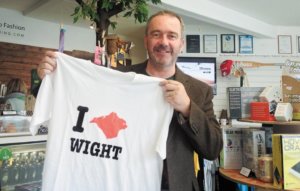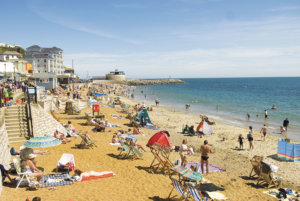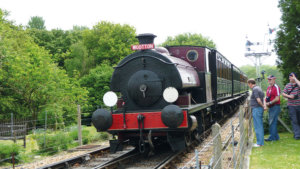 We talk to David Thornton about his vision of the Isle of Wight.
We talk to David Thornton about his vision of the Isle of Wight.
The shock withdrawal of promised Council funding for tourism has left the Island’s most important industry hanging on a knife-edge – so it’s no wonder that there is widespread rumour, anger, anxiety and some dark speculation, over what happens next.
Attempting to steer a course through these choppy waters is David Thornton, Chief Executive of Visit Isle of Wight Ltd. the private sector-led Destination Marketing Organisation (DMO) that now faces a £300,000 a year shortfall in its basic funding.
Fully aware that his own job, and those of many others in Island tourism, may be on the line, David tells Island Life how he thinks this critical situation can still be turned around.
He’s just completed a consultation of 300 Island businesses, and now David is preparing for more meetings and consultations in March and April. One of the aims is to find out if there’s enough support for a plan to impose a new levy on businesses that will help fill the shortfall left by the Council, and continue funding Visit Isle of Wight Ltd.
 Whilst the levy would be relatively small – £120 per year on each £10,000 of rateable value – the suggestion has caused controversy and misunderstanding.
Whilst the levy would be relatively small – £120 per year on each £10,000 of rateable value – the suggestion has caused controversy and misunderstanding.
To set the record straight, David insists that nothing is written in stone – the DBID is all still up for discussion.
With two levels of consultation still to come, there will be a postal ballot of businesses and the plan will not go through unless the ‘yes’ votes poll at least 51{a9dddf1bd2af35332cd5613cac8e63e148b38f23ebed35c9943c32a7f65a9815} – and those voters’ rateable values will also have to total more than 51{a9dddf1bd2af35332cd5613cac8e63e148b38f23ebed35c9943c32a7f65a9815}, to ensure an adequate mix of small and large businesses.
If the plan goes through, the ‘yes’ voters all become shareholders in the business and will then be able to contribute to the hammering out of a new governance plan.
So – a lengthy and uncertain process still lies ahead, and as David admits: “It’s painful and it’s frightening, and to get people to work together will be very complicated – but I reckon I’ve got as good a chance as anybody.
“It feels like I’m on the front line of some great manoeuvre, but the fact is that we have to find a way of commercialising the business, and evolve into something else”.
Business as usual
While all this is fermenting in the background, it’s very much business as usual for David and three staff at the free-rent office of Visit Isle of Wight – a previously unused space on the top floor of Newport’s Guildhall.
Contrary to speculation that they’re spending the remaining budget trying to preserve their own jobs, David says starkly: “Visit Isle of Wight as an organisation will run out of funds by Christmas.
“But we are not just saving contingency money to save jobs – it is being spent as we speak, on marketing for this Spring.
“That has to be our top priority, because unless we get people over here, there will be no jobs, it’s as simple as that”.
With 30 years experience in tourism marketing, and having worked for the Peak District, Alton Towers and Blackpool Pleasure Beach, David says: “The main ingredient for success in marketing is consistency and focus – you need to do it for a number of years to make a difference”.
Having completed three years of his original five-year marketing plan for the Island, he says it’s frustrating to have had the funding rug pulled away just when some green shoots were beginning to show.
 For instance, the numbers of people visiting the Island for the first time has doubled in the last three years – and that’s something he’s keen to continue building on.
For instance, the numbers of people visiting the Island for the first time has doubled in the last three years – and that’s something he’s keen to continue building on.
“I was handed an opportunity 36 months ago to take the Island in the right direction. I could see that if we were ever going to be able to interest big players in the entertainment industry – such as Merlin, who do water parks – we had to show that we could get hold of the 30 years of decay in the Island’s tourist industry and stop further falls in visitor numbers – and that’s what we have started to do”.
He added: “This year will be a challenge because Easter comes early, which leaves us with a ‘dead man’s walk’ right through April. It will feel like a difficult start to the year even if more people come”.
Bigger issues
There are, of course, wider issues to grapple with. Business owners routinely complain about ferry charges, about the down-dragging effect of poorly-run or inadequately-financed hotels with owners who are blocked by Council policy from selling up and getting out.
“There are a lot of issues to be fixed, yes,” says David, “and we are working on breaking that deadlock of accommodation providers who haven’t changed with the market and haven’t got the means to make their business marketable again.
“It won’t happen overnight, but there are some accommodation providers that have managed to re-invent themselves from basic to boutique-type B&B”.
On the subject of ferry costs, he says: “To Islanders, the ferry will always be a distress purchase, something you just have to buy.
“But when we surveyed 15,000 people about their barriers to coming to the Isle of Wight, ferry costs actually came very low down on the list.
“In fact, the visitor sees the ferry as something fantastic that adds an element to exclusivity to their holiday. They expect to pay to come over here, just as they would happily pay to go to any other resort”.
That’s why David’s approach to marketing the Island, when it comes to the all-important Unique Selling Point, is the idea of it as a ‘faraway escape’ that’s actually not too far away.
“Queen Victoria and Albert were the original examples of that kind of visitor: busy London businesspeople who want to get away from their daily pressured lives but can’t go too far from home in case they need to dash back”.
It’s no secret that Visit Isle of Wight sees the London market as important – and rumours have been circulating that there are plans for a London office, financed by hard-pressed Island businesses.
Wrong again, says David – although he explains: “I would like to open a promotional shop and drop-in centre in London, selling Island crafts and products and giving information about the destination – but if that happens, it will be as a commercial operation, entirely funded by sales”.
Global Brand
David says his overriding vision for the Island is as a ‘global brand’, which means individual businesses need to agree to work as part of a greater whole.
He knows this will be a tough call – especially if some of the larger businesses seem to attract more attention and focus and smaller ones feel left out.
“It’s just the way things work” he says.
“When I was in Derbyshire, there were always businesses grumbling about the amount of publicity and coverage that Chatsworth House constantly attracted.
“Yes, there are lots of other beautiful things in Derbyshire” he says, “but the point is that visitors need a reason to visit the county – and if Chatsworth initially attracts them then that’s just the reality of tourism and how it works.
 “But when people come to a destination, more often than not they will find lots of other things to do … that’s what we call fishing, using a bait!
“But when people come to a destination, more often than not they will find lots of other things to do … that’s what we call fishing, using a bait!
“When it comes to destination marketing it’s pointless to get into a debate about whose product it is – you just use whatever it is to create an advantage for the whole of the Isle of Wight”.
As the Island’s tourist marketing machine moves into the next few uncertain months of a very uncertain year, David is clear on one thing – he’s on the Island for the long haul, no matter what happens.
“I’ve been coming here and enjoying the Isle of Wight for 40 years so I was delighted to get the job and be able to relocate here. In fact we’ve only recently bought a house in Totland – it took a while to save for the deposit”.
He’s open about his £50,000 salary and says “I am definitely not in this for the money and have never done a job that I didn’t want to do.
“I’ve tried to keep it as lean a machine as possible with free offices and three staff, and from that we have generated around £3.5 million worth of PR coverage.
“We funded an entire website on £65,000 and have already trebled the numbers of website visitors, which is no mean achievement.
“But if people think I can come here and in three years clear up a situation that’s been in decline since the 80s, then I’m sorry to say it isn’t possible.
“Even three years ago I said it would take at least five years to start seeing results.
Now we actually are starting to see them, we hope we can build on that – but it’s going to take a massive effort and ultimately, I can only work with people who want to work together”.



